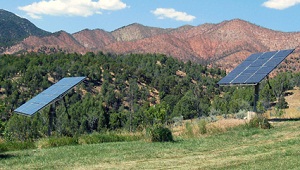Colorado solar installers cautious about future
 Despite major growth last year for Colorado’s solar industry, the future of rebates and incentives, the proverbial ground floor of the industry, is somewhat uncertain. And recent developments have forced some local companies to look outside the state line for work.
Despite major growth last year for Colorado’s solar industry, the future of rebates and incentives, the proverbial ground floor of the industry, is somewhat uncertain. And recent developments have forced some local companies to look outside the state line for work.
Both Black Hills Energy and Xcel Energy, the biggest utilities in the state, have reduced or entirely froze rebates for solar installations, and the consequences are being felt statewide.
Major players like Main Street Power, A boulder-based solar contractor, have been scaling down their Colorado contracts. In fact, Main Street has no pending contracts in the state at this time. The company is currently wrapping up its last project in the state, 2.8 megawatts of distributed solar across 35 sites for Denver Public Schools.
“That’s our last one in the state for now,” said Robert Cooper, an engineer with Main Street Power. Cooper was one of the reps sent by Main Street to man the booth at the recent Colorado Solar Energy Industries Association (COSEIA) convention in Loveland, Colo.
“Since the Solar Rewards Program was reduced, and the REC payments dropped, it’s been tough,” said Marc Bencivenni, Main Street’s Project Manager. “We want to stay here; it’s our home, but it’s difficult.”
Bencivenni said that until solar incentives get “rebooted,” the future of solar development in the state seems tenuous.
“A feed-in tariff would be nice,” he said. “I think the Ontario program is a good blueprint.”
Ontario has seen a lot of success with its own feed-in-tariff program, and Colorado energy leaders are currently discussing ways that the program can be adopted in the state. But the Ontario program isn’t perfect.
“We need to learn from their mistakes,” he said. “They are really backlogged.”
Main Street is involved in those discussions, as well as talks with local governments.
“We are very interested in working with COSEIA and legislators,” he said. “We’re very involved in that.”
Xcel Energy recently reduced payouts in its Solar Rewards Program, so Main Street, along with other solar contractors in the state, has been trying to work with the lower rebate amount.
But Bencivenni is quick to avoid painting Xcel as the bad guy.
“Xcel has done a great job, really,” he said. “Honestly, we wouldn’t be here if it wasn’t for them. Solar is an incentive-based industry—but municipal utilities need to step up.”
To make matters worse, yesterday, Feb. 16, Xcel announced another reduction in its Solar Rewards Program, citing lower costs-per-panel.
The idea, according to Xcel, is to give the industry another shove out of the nest, in order to help it to become more self-sustaining. The payout-per-watt was lowered from $2.35 to $2.01 for small systems (0.5 to 10 kW). Rebates for larger systems will be adjusted similarly.
At first glance, it looks grim, but there’s more than meets the eye with Xcel’s rebate.
“The incentive has been reducing. But that’s what it’s supposed to do,” said SolarCity Regional Director for Colorado Eric Wittenberg. The purpose of the program is ostensibly to wean the industry off of the incentive. “Xcel has one of the more well-thought-out incentive programs; it’s transparent.”
SolarCity is inarguably one of the more successful outfits in Colorado. That’s due in part to the company’s solar leasing structure, which enables customers to install a system without upfront costs. Like all solar installers, there’s a delicate balance with incentives and rebate programs, but Wittenberg said that it’s far more complicated than a simple cause and effect relationship—incentives go down: installers go broke.
“There are three main concerns of a solar company: policies, power rates and incentives,” he said. “In some cases, the rebates are very low but the power rate is very high. If the rebates are reducing faster than our costs are, it’s a problem, but right now, the rebate is over $2 a watt, which is attractive.”
Not only are the power rates and incentives in the state attractive enough to keep SolarCity afloat, but the company is expanding, opening up a new office in Parker, Colo., just southeast of Denver.
“It’s not that we’re not concerned for the future, but our business is growing,” he said. “We’re hiring every month.”
Part of that stability comes from SolarCity’s very successful third-party investment structure, but some is just operating in the right place at the right time.
“The situation in Colorado isn’t bad, but the future is uncertain,” he said. “Every time the rebate changes, we have to reassess.”
In late 2010, Black Hills Energy froze its solar rebate program, and at the time, SolarCity wasn’t doing much work in Southern Colorado. But that’s changed.
“The Black Hills phenomenon is a real one,” he said. “Up until recently, Black Hills wasn’t in our territory. But we are extending into Colo Springs. We’re trying to participate through COSEIA to negotiate with Black Hills to renew the program.”
As of this writing, Black Hills Energy has no plans to reboot the solar rebate program.
Image courtesy of Cosolar.



